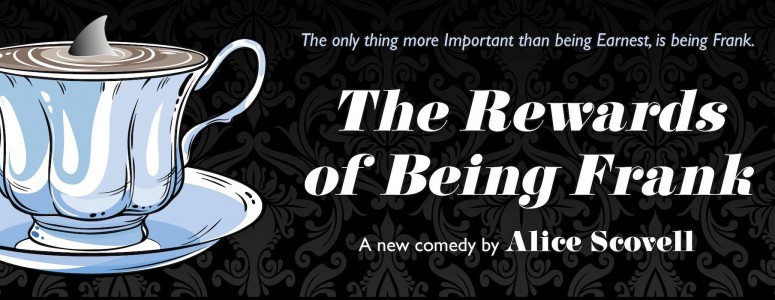Who knew that Cecily and Gwendolen would get The Seven Year Itch?
Playwright Alice Scovell takes us to the eighth year of their marriages in her sequel to THE IMPORTANCE OF BEING EARNEST. How ready (and randy) these two wives are to cheat on Algernon and Ernest.
It’s an inspired idea. The even better news, though, is that Scovell has followed through with a delightful full-length play. Any fan of Oscar Wilde’s 1895 “trivial comedy for serious people” – and who isn’t one? – will appreciate what she’s accomplished in THE REWARDS OF BEING FRANK.
Scovell starts with Cecily and Gwendolen seeking an after-school tutor for their children. Applying for the job is Mr. Frank Teacher.
Did Scovell reach for an all-too-convenient joke by choosing that surname? Well, Wilde repeatedly made much of the name Ernest, so Scovell can’t be faulted for following his lead.
Although another playwright long before them asked “What’s in a name?” Scovell agrees with Wilde that there’s much. Frank frankly tells it like it is, proving that Wilde’s Cecily isn’t the only one whose policy is to “call a spade a spade.”
We’d admire Frank if he didn’t show the worst attributes of a ladies’ man time and time and (literally) time again. After coming on to Cecily and then moments later to Gwendolen, we see that Scovell should have substituted the “T” in “Teacher” with an “L” and dropped the “a.”
So while Wilde’s masterpiece has Gwendolen and Cecily mistakenly assume that they’re in love with the same man, in Scovell’s play they actually are (or, at the very least, infatuated). So they leave a note for their husbands and go off to Cecily’s beloved country (although Gwendolen, as in the original play, makes clear that she still prefers the city).
When Algernon reads the note, he joyously exclaims, “We have wriggled off the hook!” Ernest gleefully agrees. The Princes in Into the Woods aren’t the only ones bored with marriage.
All well and good until the husbands consider the distinct possibility that their wives could be cheating on them. Just as quickly, they discard the notion. Yes, people do believe what they want to believe.
The difference is that they feel guilty that they haven’t been more attentive spouses (which is more than we can say for their wives). So off they go to the country to make amends, if not accusations.
Don’t expect to find two of EARNEST’s characters there. Perhaps Miss Prism is doing jail time for child endangerment, while the Revered Canon Chasuble, D.D. is in church praying for her release.
(For that matter, also missing in action are Lane, Algernon’s manservant, and Merriman, butler to Ernest and Cecily. However, thy do get a mention, so we know that each can hold a job.)
And what of Lady Bracknell, you’ve been impatiently asking. Needless to say, any riff on EARNEST would have to include her, despite the fact that she really doesn’t show up all that much in Wilde’s play.
(Indeed, she sits out his entire second act. With the possible exception of The Phantom of the Opera, no character as vivid in any stage work has so little stage time.)
Anyone writing for Lady Bracknell had best have some good quips ready to go. Scovell does so well that one may believe that she’s Wilde reincarnated. (Of her late husband, Lady Bracknell says that “his understanding has greatly improved with his death.”) Although scenic designer Samantha Reno has given Cecily a nice living room, leave it to the ever-critical Lady to sarcastically sneer and say, “I love what you’ve not done with the place.” And if you’ve ever wondered about Lady Bracknell’s sexual history (and here’s suspecting no one has), Scovell has her speak of her “discreet indiscretions.”
Christine Pedi, acting haughtier than Gwyneth Paltrow and all the Kardashians combined, bulls-eyes those and all other Scovell zingers. Pedi has her face adopt a pseudo-tolerance that still manages to show her belief that that no one could possibly be as wise as she. “The most important role of marriage is to control other people,” she staunchly says, utterly unafraid that anyone will contradict her. Through all this, she semi-smiles and makes her half-closed eyes say “Case closed.”
Director Stephen Burdman, in giving a spirited production, gets fine performances from everyone else, too. As Algernon, James Evans amuses every time he punctuates a line by poking his entire head forward as if he were a turtle who’s decided to see what’s out there in the world. He and Jeremy Dubin’s Ernest do well by the same type of verbal sparring match that Gwendolen and Cecily have in Wilde’s play.
The prosecutor-like fervor that Lady Bracknell grilled Jack in EARNEST is nicely replicated when Kelly Mengelkoch’s Gwendolen initially interviews Frank (the elegant Moboluwaji Ademide Akintilo) for the job. (Like mother, like daughter.)
Tora Nogami Alexander delights as Cecily, especially when she says that her “favorite part of the play is the interval.” That’s her prerogative, but she might very well feel differently if she saw THE REWARDS OF BEING FRANK.
And where does all this leave EARNEST virgins? When the show starts, they may be slouching in a semi-recumbent posture. Soon, though, the enjoyable comedy of (bad) manners will have them sitting up – in earnest.




